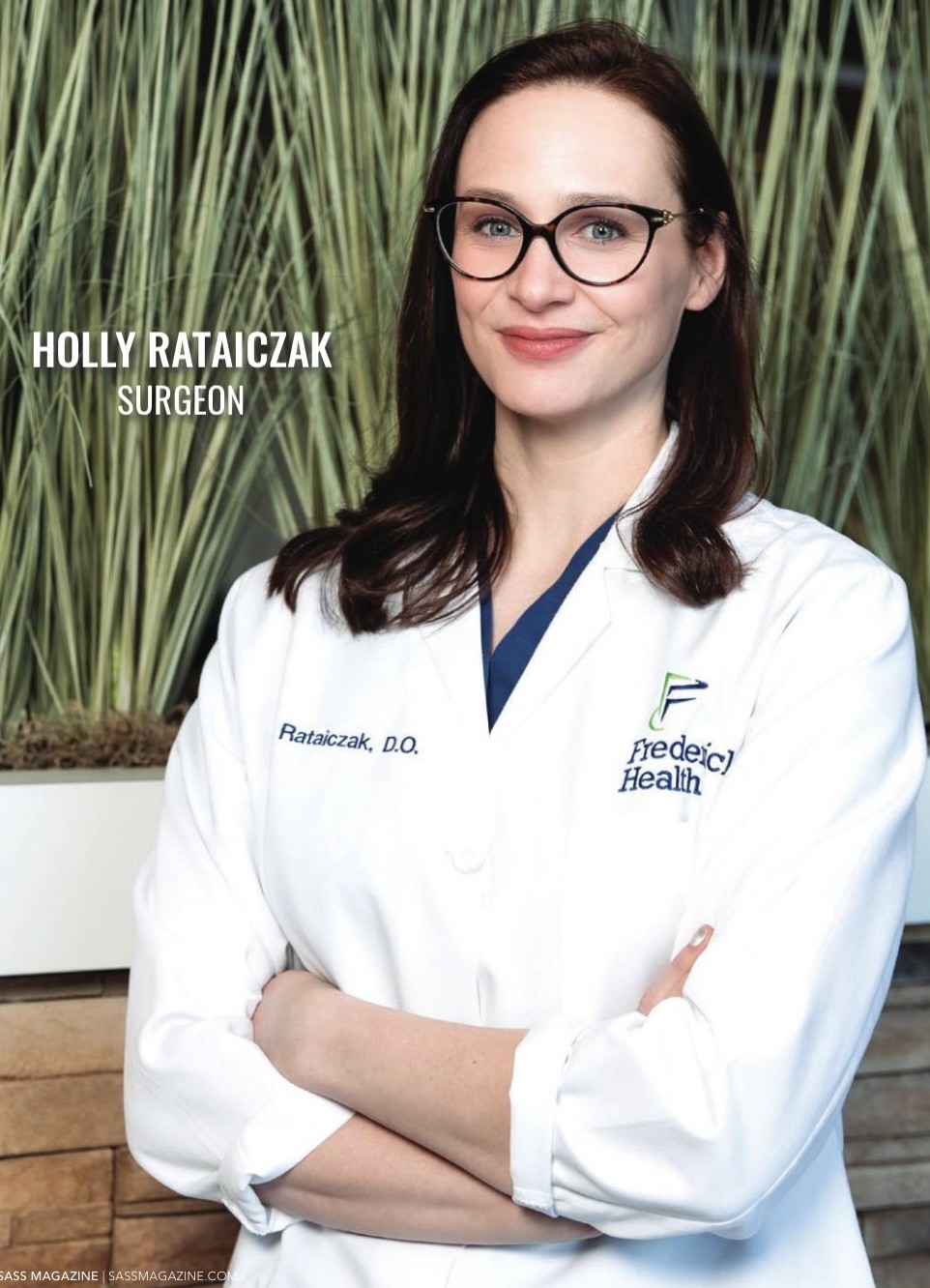Get To Know Dr. Holly Rataiczak
- Category: Frederick Health Services, Women's Health, Frederick Health Medical Group, Hospital Services & Programs
- Posted On:
- Written By: Josh Faust
 Frederick Health Medical Group has over 180 expert providers dedicated to helping patients live their healthiest life. Dr. Holly Rataiczak has been practicing in the field of Otolaryngology for 12 years. As a surgeon, she specializes in diagnosing and treating conditions related to the ears, nose, and throat as well as head and neck structures.
Frederick Health Medical Group has over 180 expert providers dedicated to helping patients live their healthiest life. Dr. Holly Rataiczak has been practicing in the field of Otolaryngology for 12 years. As a surgeon, she specializes in diagnosing and treating conditions related to the ears, nose, and throat as well as head and neck structures.
"I see patients of all ages and perform a range of surgeries to treat nasal congestion, sleep apnea, thyroid disease, and vocal fold disorders." said Dr. Rataiczak
Dr. Rataiczak joined the Frederick Health team two years ago after being honorably discharged from the United States Army. She is accepting new patients. Click here to learn more about Frederick Health's Ear, Nose & Throat Care, and Audiology.
Recently, Dr. Rataiczak was interviewed by Sass Magazine about her experience, her success, and how she makes a difference. This article was originally featured in their January 2025 Wellness Issue. A link to that article can be found here.
Her answers to those questions are below.
How did you get to where you are today?
I've always been driven by a strong desire to help others and possessed a natural aptitude for biological sciences. In college, I worked as a laboratory assistant, using fine instruments to isolate the central nervous system in fruit flies for research. During my surgical rotations in medical school, I became fascinated by the body's innate ability to heal itself. A surgeon uses technical skills to address structural or physiological problems, and creates the right conditions for recovery and wellness. I realized this was the best way I could combine my skills and my passion to make a difference. It's a privilege to be part of a profession that has such a direct impact on people's lives.
Who has made an impact on you?
Growing up, my grandmother showed me that you can use compassion to deliver effective, knowledgeable care. She worked as a nurse for over 40 years and was a significant influence on my life and my sense of self.
What has helped you the most with your success?
Attention to detail and humility. To learn and grown, you must be open to constructive criticism. As a surgeon, being meticulous is essential in every aspect of patient care, from making accurate diagnoses to forming the most beneficial medical or surgical treatment plans.
What is the biggest challenge you've overcome?
The biggest, most frustrating challenge has often been overcoming stereotypes. Most people assume their surgeon will be a male. Even after multiple clinic visits, and spending time working through and treating a patient's issue, people often assume I am a nurse or physicians assistant. While they are often relieved that I am the one performing the surgery, some still seem a bit surprised.
How advice would give to readers?
1) Build strong relationships with your team. Success is never achieved in isolation.
2) Embrace learning and adaptability. Take every opportunity to reflect, learn, and grow - even if it is hard.
3) Maintain your sense of self. It's easy to get lost in the pressures and tasks of daily life but find something that keeps you grounded. For me, it's my family and sense of humor.
How do you make a difference?
Visiting a surgeon can be incredibly stressful for patients. I try to put my patients at ease by actively listening to them and taking time for clear explanations. We share the same goal: to improve their condition. By ensuring patients understand their diagnosis and treatment options, we work together to achieve the best outcomes.
How do you reward yourself when you're reaching a goal or after a hard day of work?
I enjoy going for neighborhood walks with my daughter or cooking a meal with my husband. I also won't turn down a good bourbon.
What else would you like to share with readers?
It's crucial to take every patient's symptoms and concerns seriously. Studies show that women's pain is more likely to be underestimated or dismissed compared to men's. Women are also underrepresented in clinical trials. As a medical community, we must acknowledge and address these disparities to ensure equitable and effective care for all patients.



